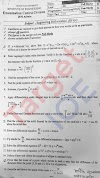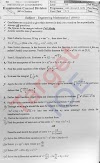Course Objectives:
Basic Electrical Engineering Provide the concept of the circuit. Students will understand many theorem and concept for solving circuit base problems also DC, AC and 3 phase Electrics circuits.
From Chapter 1 - 10 marks
From Chapter 2 - 5 marks
From Chapter 3- 25 marks
From Chapter 4 - 5 marks
From Chapter 5,6 - 15 marks
From Chapter 7 - 10 marks
From Chapter 8 - 10 marks
From Chapter 2 - 5 marks
From Chapter 3- 25 marks
From Chapter 4 - 5 marks
From Chapter 5,6 - 15 marks
From Chapter 7 - 10 marks
From Chapter 8 - 10 marks
Note:- These marks may be changed.
1) General Electric System ( 6 h | 10 Marks )
- Constituent parts of electrical system.
- Current flow in a circuit
- Electromotive force and potential difference
- Electrical units
- Ohm's law
- Resistor & Resistivity
- Temperature rise & temperature coefficient of resistance
- Voltage and Current sources
2) DC Circuits ( 4 h | 5 Marks )
- Series circuit
- Parallel networks
- Kirchhoff's laws
- Power and Energy
3) Network Theorems ( 12 | 25 Marks )
- Application of Kirchhoff's laws in network solution
- Star-delta & delta star transformation
- Superposition Theorem
- Thevenin's Theorem
- Nortan's Theorem
- Maximum power transfer theorem
- Reciprocity theorem
4) Inductance & Capacitance in Electric Circuits ( 4 h | 5 Marks )
- General concept of capacitance
- General concept of inductance
5) Alternating Quantities ( 2 h | ~15 Marks)
- AC Systems
- Waveform, terms & definitions
- Average and RMS values of current & voltage
- Phasor representation
6) Single-Phase AC circuits ( 6 h | ~15 Marks )
- AC in Resistive circuits
- Current & voltage in an inductive circuits
- Current and voltage in a capacitive circuits
- Concept of complex impedance and admittance
- AC Series and Parallel circuits
- RL, RC and RLC circuit analysis & phasor representation
7) Power in AC circuits ( 4 h | 10 Marks)
- Power in resistive circuits
- Power in an inductive and capacitive circuits
- Power in circuit with resistance and reactance
- Active and reactive power
- Power factor, its practical importance
- Improvement of power factor
- Measurement of power in a single-phase AC circuits
8) Three-Phase Circuit Analysis ( 6 h | 10 Marks )
- Basic concepts & advantages of 3-phase circuits
- Phasor representation of star & delta connection
- Phase and Line Quantities
- Voltage & current computation in 3-phase balance & unbalance circuits
- Real and reactive power computation
- Measurements of power & power factor in the 3-phase system






0 Comments